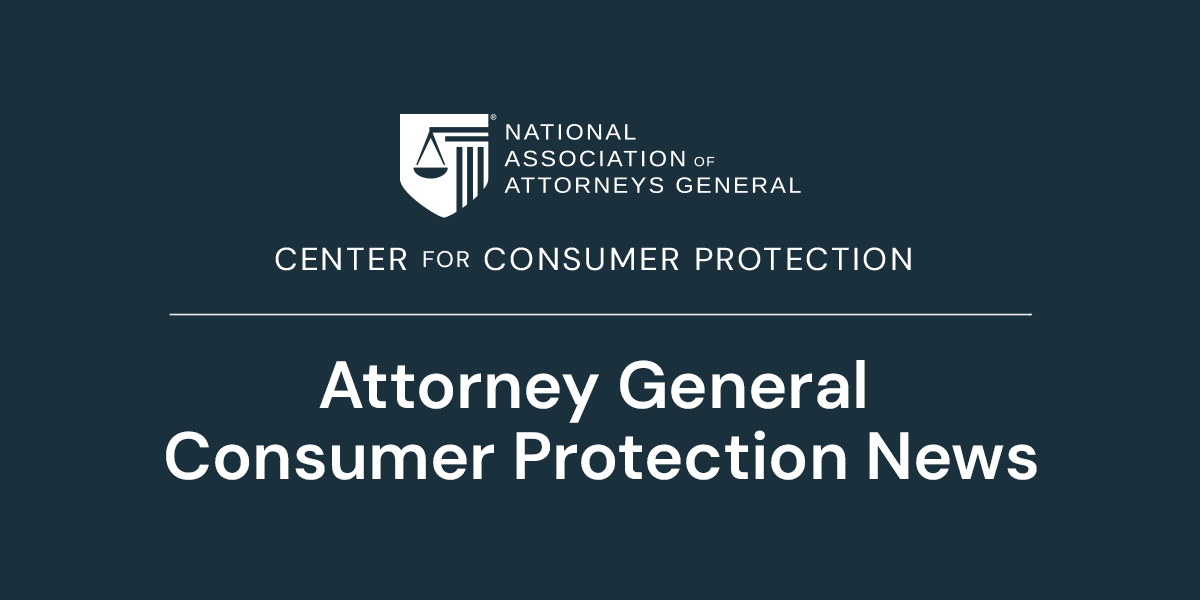Multistate Actions
Led by Arizona Attorney General Kris Mayes, Indiana Attorney General Todd Rokita, North Carolina Attorney General Josh Stein, and Ohio Attorney General Dave Yost, a bipartisan coalition of 49 attorneys general filed a multistate enforcement action against Avid Telecom, a Voice over Internet Protocol (VoIP) service provider. The lawsuit alleges that Avid Telecom and its owners violated the Telephone Consumer Protection Act, the Telemarketing Sales Rule, and other federal and state telemarketing and consumer laws. According to the complaint, between December 2018 and January 2023, Avid sent or attempted to transmit more than 24.5 billion calls and helped make hundreds of millions of calls using spoofed ID numbers, including more than 8.4 million calls that appeared to be from government or law enforcement, as well as other private companies.
Led by New York Attorney General Letitia James, a group of 24 attorneys general filed a multistate amicus brief in the U.S. Supreme Court supporting the authority of the CFPB. In Consumer Financial Protection Bureau v. Community Financial Services Association of America, Ltd., the Fifth Circuit concluded that the agency’s operations violate the U.S. Constitution’s Appropriations Clause because it does not receive an annual appropriation from Congress and is instead funded through the Federal Reserve. The court ordered that a payday lending regulation created by the agency be vacated. The brief of the attorneys general urges the Supreme Court to reverse the decision, claiming it jeopardizes the beneficial consumer protection and regulatory actions taken by the CFPB.
A federal district court agreed with a bipartisan coalition of 7 attorneys general from Arizona, California, the District of Columbia, Florida, Massachusetts, Pennsylvania, and Virginia and the U.S. Department of Justice that the Northeast Alliance, a joint venture between American Airlines and JetBlue, was anticompetitive and violated section 1 of the Sherman Act. The states and U.S. Department of Justice filed their complaint challenging the joint venture in September 2021. The court blocked American Airlines and JetBlue from continuing or further implementing the Northeast Alliance.
Florida Attorney General Ashley Moody, New Jersey Attorney General Mathew J. Platkin, Oregon Attorney General Ellen Rosenblum, and Pennsylvania Attorney General Michelle Henry, reached a $2.5-million multistate settlement with EyeMed over a data breach that compromised the personal information of millions of patients. The multistate investigation found deficiencies in EyeMed’s data security program that allegedly contributed to the breach in violation of state consumer protection and personal information protection laws and the federal Health Insurance Portability and Accountability Act.
Colorado Attorney General Phil Weiser and New York Attorney General Letitia James announced separate settlements with companies accused of generating fake comments in an attempt to influence the FCC’s repeal of net neutrality rules. Colorado settled with Ifficient, a Colorado company which allegedly acted as an intermediary on behalf of broadband clients, engaged other lead generators to enroll consumers in the campaign and supplied its client with more than 840,000 fake responses from Coloradans. New York also settled with Ifficient and announced settlements with lead generators LCX and Lead ID. LCX and Lead ID allegedly each independently fabricated responses for 1.5 million consumers.
Connecticut Attorney General William Tong, District of Columbia Attorney General Brian Schwalb, and Oregon Attorney General Ellen Rosenblum and the FTC announced a settlement over the “Premom” ovulation tracking app’s data sharing and privacy practices. The attorneys general investigated the company in coordination with the FTC, alleging that Easy Healthcare shared sensitive health care data with third parties without consumer notice or consent. Easy Healthcare agreed to resolve the investigation by making significant changes to its privacy and data security programs.
A bipartisan coalition of 51 states announced that the proceeds of a $141 million settlement with Intuit TurboTax is now being distributed to eligible consumers. The settlement, agreed to in 2022, resolved claims that Intuit improperly charged a filing fee to consumers who were eligible to file for free through the IRS Free File Program. Approximately 4.4 million consumers will receive payments nationwide.
Individual Attorney General Actions
Massachusetts Attorney General Andrea Joy Campbell secured $600,000 in relief from Recording Radio Film Connection (RRFC), an online for-profit audio-visual production school. Under the terms of the settlement, RRFC will pay $250,000, which will be distributed to students harmed by the school’s allegedly illegal practices. In addition, RRFC will discharge approximately $340,000 in institutional debt owed to the school by former students and will seek changes to credit bureau trade lines relating to the debts.
Minnesota Attorney General Keith Ellison settled a lawsuit against Juul and Altria for allegedly deceptively marketing e-cigarettes. Under the terms of the consent judgment, Juul and parent company Altria will together pay a total of $60.5 million to the State of Minnesota over an eight-year period.
New Jersey Attorney General Matthew J. Platkin announced guilty pleas to a $1.3 million internet fraud scheme involving allegedly fictitious sales of aviation equipment. Antonio P. Signo, allegedly used fake websites advertising the sale of aircraft equipment to trick companies into wiring money to Signo’s accounts. There were more than two hundred victims of the fraud over a five-year period, including operators of corporate jet services throughout the U.S., France, Israel, and the U.K.
New York Attorney General Letitia James secured $4.3 million from Coin Café, a cryptocurrency trading platforms, for allegedly defrauding investors. Coin Cafe allegedly allowed investors to store their Bitcoin in an account which was marketed as “free” wallet storage on its website, however an investigation determined that the company was charging investors outrageous and undisclosed fees to use its wallet storage. The fees were allegedly so high that they wiped out investors’ accounts entirely. As a result of the settlement, Coin Cafe will pay over $508,000 in restitution to more than 300 New York investors.
Ohio Attorney General Dave Yost announced a victory in his case against home-improvement contractor Neil Wolfe. Wolfe was ordered to pay $625,873 in restitution to nineteen consumers after an investigation revealed that after taking their down payments he performed no work, shoddy work, or incomplete work and committed a number of other deceptive business practices.
Pennsylvania Attorney General Michelle Henry announced a settlement with New York-based Fluent, LLC and its subsidiaries, for their role in allegedly causing millions of unwanted telemarketing calls to be placed to Pennsylvania residents. According to the lawsuit, Fluent and its subsidiaries collected personal information through promotional offers in which gift cards to popular retailers such as Amazon or Walmart were offered as incentives. The information was then sold as “leads” to telemarketing companies. The leads included thousands of people on the Pennsylvania and Federal “Do Not Call” lists.
Texas Attorney General Ken Paxton announced two actions, a settlement with Marriott and a lawsuit against Hyatt. related to resort fees. The settlement with Marriott International, Inc. resolves claims about allegedly hidden fees and requires that Marriott disclose clearly and conspicuously all “resort fees” and the total price of rooms as the most prominently displayed price, as well as other disclosures. The lawsuit against Hyatt alleges that the company violated Texas consumer protection laws by advertising rooms at prices that weren’t available to the public. Hyatt allegedly implemented this practice by charging consumers mandatory fees in addition to the daily rate, including resort fees or amenity fees.
Utah Attorney General Sean Reyes and the FTC announced a $15 million settlement with Response Marketing Group, LLC a company selling money-making opportunities, and its principals. The defendants also agreed to a ban from marketing such opportunities in the future. This is the largest consumer settlement in Utah history. The suit alleged that Response Marketing used misrepresentations and unfounded promises to sell expensive real estate investment training programs. Additionally, two real estate celebrities who endorsed the training agreed to pay $1.7 million.
Washington Attorney General Bob Ferguson announced that his office has entered into a consent decree with Google, under which Google will pay $39.9 million to resolve claims that it used misleading location tracking practices. The settlement requires Google to be clearer about its location tracking. The lawsuit alleged that Google deceptively led consumers to believe that they could control how Google collected their location data but that consumers could not actually prevent Google from collecting, storing, and profiting from this data. Attorney General Ferguson also filed a lawsuit against two businesses and their owner for sending hundreds of thousands of deceptive texts and emails to Washington businesses and nonprofits. The text messages allegedly cost Washington businesses at least $163,000. The lawsuit alleges that the companies and their owner, Cameron Groom, sent deceptive solicitations that were designed to appear as though they were sent by the Secretary of State and demanded a $200 filing fee for filing annual reports, not disclosing that companies could file on their own for only $60.
West Virginia Attorney General Patrick Morrisey announced a $68 million settlement with Kroger regarding opioids. The grocery chain was the last remaining defendant in a lawsuit involving Walgreens, Walmart, CVS, and Rite Aid. The settlement resolves claims that Kroger’s pharmacy operations failed to maintain effective controls as a distributor and dispenser against drug diversion that contributed to oversupply of opioids in the state.
Other articles in this edition include:






